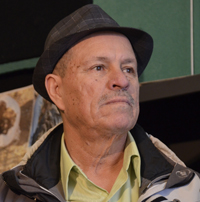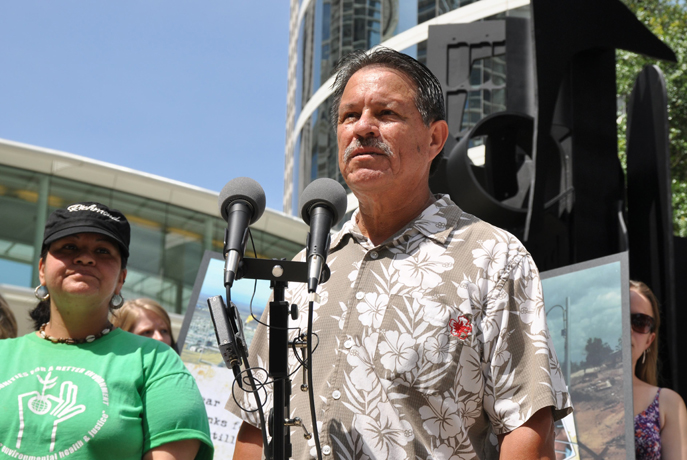West Texas native Juan Parras, who now serves as director of Texas Environmental Justice Advocacy Services (t.e.j.a.s), is the recipient of the Sierra Club's 2015 Robert Bullard Environmental Justice award. We spoke with Mr. Parras this week at his Houston office.
Where did you grow up?
I grew up in Big Spring, Texas, in the Permian Basin of West Texas, an area rich in oil and oil fields.
Did your upbringing or the place you grew up help shape your views on social justice?
Yes, for a number of reasons. I can remember wondering why the majority of Hispanics and African Americans lived on the north side of town, but most whites lived on the south side. The railroad tracks divided Big Spring into two separate communities. Our streets were rarely paved, and in fact many streets in the north side of town remain unpaved to this day. Busing was not provided for our school-age students as it was for those living in the south side of town. Our elected officials were all white. Hispanics, like myself, and African Americans were not allowed in certain restaurants, which was typical of the times, the 1940s through the 1960s. This was the beginning of my observation of social injustice.
I also experienced firsthand what my father and African American veterans were going through. My father, Juan C. Parras, received his honorable discharge from the Army on October 20, 1945. He was wounded three times: On July 9, 1944 (Italy), September 25, 1944 (Italy), and January 2, 1945 (Italy), and he received a Purple Heart with two bronze clusters, two overseas service bars, a European-African-Middle Eastern ribbon with two bronze stars. Yet he returned from World War II to face even greater personal and discriminatory practices in receiving veterans' benefits, employment discrimination, and little to no respect for his service during WWII. It was a practice that we knew all too well during those times, against Hispanic and African American servicemen.
At an early age I started to think about "social injustices," but fortunately for us -- all ten of us -- our parents never taught us to discriminate or hate. Instead they encouraged us to stay in school and taught us a good work ethic and to respect others. I am proud of my Hispanic (Mexican) heritage. Both of my parents were born in the USA (Tejas), but they were not treated as citizens of this country. Despite all of this, we moved forward, and I am proud to say that we continue to struggle with modern-day issues now as in the past, and we will continue fighting for social justice. It is troubling, even in these times, to witness racism, discrimination, and hate in the treatment of minorities and others in our society. Social justice struggles seem never-ending. But one should never give up on hope. Our organization, the Texas Environmental Justice Advocacy Services (t.e.j.a.s.), seeks and continues to fight for environmental justice, which is really no different than social justice, as EJ mostly affects minorities who are being treated like second-class citizens.
What led to your interest in the environment? Did you spend a lot of time outdoors when you were a kid/young man? Did your community suffer from pollution?
I spent my teenage years in the Boy Scouts, Troop 7, in Big Spring, under the leadership of Bert Andrews. Troop 7 was located on the north side of town, in what we referred to as El Northside. Whenever and wherever we went camping with the Boy Scouts, Mr. Andrews would always line us up in a single file and then instruct us to walk in a straight line, picking up all the trash on the grounds, even if it was trash that other people left behind. We always left our camping ground cleaner than when we got there. We learned at an early age what an environmental cleanup was and how it was so important to clean up our mess, before it became legislated.
Our community had and still has one refinery. Back then it was Humble Oil, which became Standard Oil and then Exxon. Recently, an explosion occurred, and the blast was felt 87 miles away, in the city of San Angelo. The City of Big Spring has had to use sewage treatment water for human consumption. This is still happening in a lot of places where water is low, where wastewater is being treated for human consumption. Imagine…
As for what led to my interest in the environment, let's just say I was in the right place at the right time. Right after the Executive Order on Environmental Justice was passed by President Clinton in 1994, I began working in Louisiana with the Louisiana Labor Neighbor Project, and our first EJ case was against Shintech, a PVC (polyvinyl chloride) company that wanted to build a PVC plant in Convent, La., a community that at the time was 87 percent African American. With the assistance of Louisiana Environmental Action Now, Greenpeace, Labor Neighbor Project, Tulane University, and others, we were able to keep Shintech out of Convent.
What led to your interest and activism on environmental justice issues?
It was and remains based on the principles of social justice, fairness, equity, and the fair treatment of all in regard to environmental issues.
 Can you articulate your definition of environmental justice, or environmental injustice?
Can you articulate your definition of environmental justice, or environmental injustice?
For people who know little or nothing about environmental justice issues, it becomes all-too easy to grasp when you take them into neighborhoods affected by environmental hazards, degradation, pollution, etc. In many cases it is a case of "seeing is believing" how low-income communities are underserved and exposed to the worst environmental hazards imaginable. It is a comparison of the good, the bad, and the ugly -- all of which primarily exist in communities of color.
Who bears the brunt of environmental injustice?
Taxpayers, in the sense that they have to pay for Superfund cleanups; hospitals, because they have to treat patients from low-income communities who can't afford their own health care; schools, because they are often built next to polluting facilities, resulting high levels of absenteeism and learning disabilities associated with exposure to toxic pollution; communities and people of color, because polluting facilities are located in or near where they live; and we the citizens, because taxpayers have to foot the bill for the damage done by industry.
Do you think strides are being made in combating environmental injustice in the U.S.?
No, absolutely not.
Are there certain accomplishments of which you are particularly proud?
Two or three EJ victories are not much to be proud of; and unfortunately, there has been minimal progress in combatting environmental injustice in low-income communities of color over the past 22 years since passage of the Executive Order on Environmental Justice.
Why is achieving environmental justice so critical to the future success of the environmental movement?
In my opinion, environmental justice is really about addressing intentional environmentally discriminatory practices perpetrated by a system that is aware of and knowledgeable of the consequences of its actions, and seemingly justifies them by claiming it is solely a smart "business decision" to build their polluting facilities in low-income communities of color. I do not see environmental justice as a movement; I see it as it as a discriminatory practice that needs to be abolished once and for all.
What does it mean to you to win an award named after Dr. Robert Bullard, the "father of environmental justice"?
I hold Dr. Bullard in high esteem, so it is an honor I am very proud of. But neither I nor anyone I personally know seeks awards for our work. We seek environmental justice for where we live, where we play, and where we work. Is that too much to ask?
